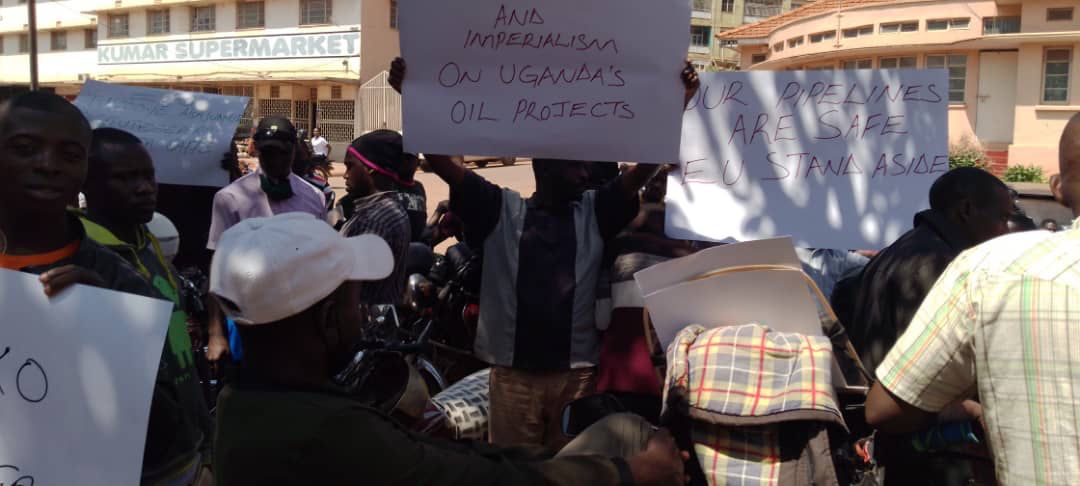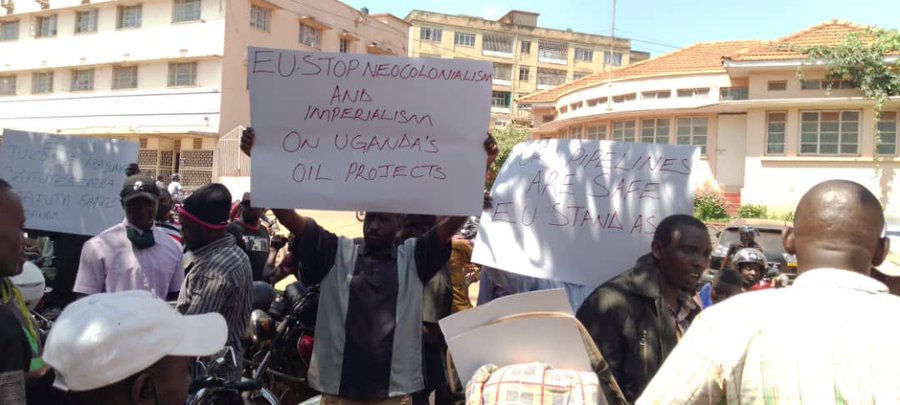Dozens of Ugandan activists have on Tuesday protested a European Union (EU) decision stopping the construction of the East African Crude Oil Pipeline (EACOP).
Dozens of activists holding placards with messages disagreeing with the resolution paraded at the EU offices located at Crested Towers on Hannington Road, in Kampala.
The group led a peaceful and organized procession on motorcycles until the offices.

They held several placards with strong messages to the EU to halt its interference on affairs of independent African states. Some read ‘EU stop Neo colonialism and imperialism on Uganda’s oil projects’, ‘Our pipelines are safe EU, stand aside’, ‘EU Uganda Muji veeko oil kyabuggaga kyafe’ among others
The group was led by one Frank Mawejje, who stated that the EU has no business meddling in Uganda’s economic decisions or that of her partners regardless whether they are based in their region or not.
He mentions Total Energies, a France based company that holds the highest stake in the deal, standing at 62 percent of the East African Crude Oil Pipeline (EACOP) project.
Mawejje says they petitioned the EU to respectfully withdraw from Ugandan oil.

Ugandans have continued the debate on resolutions by the EU Parliament seeking to halt the country’s multi billion oil investment deal. The project is estimated to bring in
Last week, the European Union Parliament criticized the EACOP project on grounds that it violates human rights and environmental concerns.
The EU legislator Parliament recommended the project is halted for one year and that alternative routes be established that would not affect as many people and the ecosystem.
The 1400kmEast African Crude Oil Pipeline project is largely funded by France based Total Energies, Uganda National Oil Company, UNOC, and Petroleum Authority of Uganda.
EACOP runs from Kabaale, Hoima district in Uganda to the Chongoleani Peninsula near Tanga Port in Tanzania. 80% of the pipeline is in Tanzania.The pipeline runs from parts of Western Uganda to Tanzania’s Indian Ocean port of Tanga.
In an interview with the BBC recently, Elly Karuhanga, the Uganda Chamber of Mines and Petroleum boss allayed fears that the oil construction project was forcefully evicting land owners and that the project was unsafe.
“Every person whose land is passed on will be compensated, even the Deputy Speaker of Parliament made that clear. So far, 98 percent of people have agreed to work with us and only 523 households will be affected permanently and compensated. The construction is a transit corridor burried 6 feet underground and affects mostly farm lands and public roads,” he said
Meanwhile, TotalEnergies in a statement stated that the oil investment route between the Uganda and Tanzania was a strategic decision.

“Uganda and Tanzania are sovereign states that have made the strategic choice to exploit their natural resources to contribute to the development of their countries. They chose TotalEnergies, guaranteeing the implementation of the best social and environmental standards with a project that will emit significantly less carbon than the current average.” says the company in a statement.
President Yoweri Museveni said he draws his confidence in the safety of the ecosystem and the population from the expert advice by Total Energies.
“We should remember that Total Energies convinced me about the Pipeline idea; if they choose to listen to the EU Parliament, we shall find someone else to work with,” he said, assuring all that whatever happens, Uganda will have her oil flowing by 2025.
Parliament of Uganda has also condemned the EU decision in the highest terms possible. Thomas Tayebwa the Deputy Speaker for Parliament stated that over 70% of the persons affected by land acquisition for the projects have been compensated or resettled and are undergoing livelihood improvement projects in agriculture, financial literacy, and vocational skills, among others.
He further stated that efforts to fully compensate all project affected persons are ongoing, with cooperation from the local communities and leaders.



